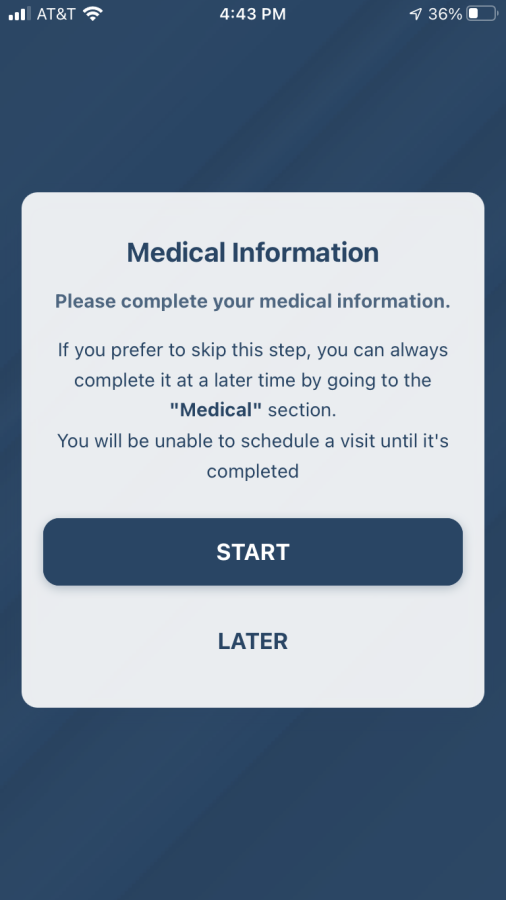TimelyCare is inaccessible
New virtual care service is confusing and poorly thought out
TimelyCare, even in emergency situations, requires users to fill out a medical history questionnaire.
February 17, 2022
During a recent crisis, I decided to utilize the university’s new TimelyCare service, which is advertised as “24/7 virtual care, from anywhere”, on the WFU University Counseling Center (UCC) website. I was promptly disappointed by the lack of accessibility and ineffectiveness of the service.
The UCC has had a long-standing struggle with its availability of resources for students struggling with mental health issues. In some sort of front for a solution, the UCC has partnered with TimelyCare.
TimelyCare’s purpose is to “expand and enhance mental health support to Wake Forest students.” In my eyes, it achieves this at the bare-minimum level.
When I researched TimelyCare before using it, I found the website difficult to navigate and couldn’t easily figure out how to use the web app — it is a very unintuitive model for students who are accustomed to using their laptops.
Because I was given no instruction on how to access the app from a laptop and presented with a phone-centric model on the website, I assumed the phone app was the only option.
I downloaded the app and was met with questions about my medical history. I pressed ‘skip’ — after all, I was in the middle of a mental health crisis — and learned, after attempting to contact a clinician, that I needed to enter my full medical history in order to access services.
This feels — for a lack of a better term — ridiculous. Since when do providers need to know whether or not my maternal grandparents suffer from heart issues in order to treat my mental health issues? I had to put in a full history of medication, including dose and frequency, to reach the most basic level of crisis support. Medical history is important when treating clients, but it is not a priority when lives are at stake.
The TimelyCare app requires you to jump through hoops, and if you somehow jump through all these hoops in spite of your frustration and worsening mental health, you will finally get access to providers. You have three options: TalkNow, which is advertised as “Mental Health/Emotional Support”, and two ‘scheduled’ options — “Counseling” and “Health Coaching.”
I imagine the majority of users utilize TalkNow, which is designed for immediate access to mental health resources. When you select TalkNow, you are asked to designate which areas of mental health you are struggling with, and then you are required to choose between a phone or video chat with a provider.
Let me just say that there should absolutely be a ‘chat’ option on any confidential mental health service, especially in a college setting. Many people have roommates and don’t feel comfortable speaking on the phone with a provider in the settings that are available to them. Moreover, speaking on the phone is anxiety-inducing for many in a crisis situation, including myself. I ended up not utilizing TimelyCare at all as a result of the lack of chat options available.
The app also logs you out after periods of inactivity, requiring you to go through the Wake Forest double-authentication process, which is especially annoying on a phone. Little details like this should not be overlooked when the mental health of students is on the line.
TimelyCare is a sad excuse for a mental health resource for Wake Forest students. Time and time again, the university has failed students by being unable to provide them access to things that are supposed to help them with their mental health issues.
TimelyCare is partnered with the university — it’s not even a university-specific resource. In order to truly help struggling students, there should be more university-specific resources, such as adequate counseling staff and access to unlimited appointments.













EC • Feb 7, 2024 at 5:30 pm
This article is nearly two years old but I wanted to thank you for writing it. TC came across my job search radar and this is one of the few reviews I saw detailing the intake flow, and while they may have “improved” some things with time, rolling out an application in the state you experienced it highlights their leadership’s intent by underscoring how much more important your personal data was to them than your mental health.
Also worth noting that while researching telehealth organizations, many of them will resort to using staff to write fake reviews or play defense across Reddit and social media whenever someone is critical of their product, and it would not surprise me if that’s who “Edith” is. Either way, their advice is fundamentally wrong at best, and puts you at much greater physical and mental risk in the short- and long-term at worst.
I truly hope you and the students at your campus have found more tangible solutions that work for you!
Kam • Jun 2, 2023 at 12:39 pm
I use TC through my university, a different one than yours, and recently had a bad experience. I don’t find the app experience too bad, but the provider kept repeating the same questions at the start of session and many questions seemed redundant. I confirmed that every session starts the same way. I was disappointed to think that the session was so mechanical and we had no way of building any rapport because the app requires the company to do this. They were also late to the appointment by 6 minutes.
Edith • Nov 18, 2022 at 3:43 pm
A “crisis” is a situation is one that is life-threatening, not one that is overwhelming. If you were experiencing a crisis you needed to contact 911, especially if you were at-risk of ending your life, not a chat box. If your situation was not an immediate risk of harm to yourself what kind of support were you expecting from a chat box? Someone to type back “I’m sorry to hear that, tell me more.”? I think you are confusing mental health services and treatment with support. If you seek support contact the crisis text line. This article comes across as a yelp-review complaint and lacks critical thought, argumentative or journalistic skills. Why not provide readers with a tree-style resource of who to call when, or suggest that all new students register for TimelyCare so that if they require on-demand services they do not have to answer questions that could be potential barriers? Nope. You just yell into the void that something took you 5 minutes to do. This is embarrassing lol
Mary S Jackson • Mar 16, 2024 at 1:04 pm
You seem like a trolling acct hired by (un)timely care to attack those who report failings of the (inadequate) services.